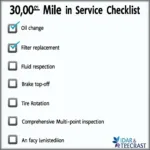Is 100 amp service enough for your electric car? This is a crucial question for any EV owner, especially as charging speeds and battery capacities continue to increase. Choosing the right electrical service is vital for a smooth and efficient charging experience. Let’s dive into the details to determine whether a 100 amp service will meet your needs.
Understanding Your EV Charging Needs
Before deciding on a 100 amp service, it’s important to understand the charging requirements of your specific electric vehicle. Different EVs have different onboard charger capacities, affecting how quickly they can draw power. This, in turn, influences the amperage required from your home’s electrical panel. For example, a vehicle with a 7.2 kW onboard charger will charge slower than one with an 11.5 kW charger, even on the same circuit.
Factors such as your daily driving habits and the availability of public charging stations also play a role. If you drive long distances daily and rely primarily on home charging, you’ll need a faster charging solution than someone who primarily uses public chargers and only tops up their battery at home.
100 Amp Service: Is It Sufficient?
For many EV owners, a 100 amp service is perfectly adequate. It provides enough power to charge most EVs overnight, even with a higher-powered onboard charger. However, if you have other significant electrical loads in your home, such as air conditioning, electric heating, or a hot tub, a 100 amp service might be strained. Simultaneously running these appliances while charging your EV could lead to tripped breakers or even potential electrical hazards.
Consider a scenario where you’re running your air conditioner on a hot summer day, cooking dinner in your electric oven, and then plug in your EV to charge. A 100 amp service might struggle to handle this combined load.
Evaluating Your Home’s Electrical Capacity
Determining whether your existing 100 amp service is sufficient requires a thorough assessment of your current electrical usage. A qualified electrician can perform a load calculation to determine your average and peak power consumption. This calculation will take into account all your appliances, lighting, and other electrical devices to determine the available capacity for EV charging.
Upgrading to a Higher Amperage Service
If your current 100 amp service is insufficient, upgrading to a 200 amp service is a viable option. This upgrade provides ample power for EV charging and other household appliances, eliminating concerns about overloading your electrical system. While an upgrade involves an upfront cost, it offers long-term benefits, including faster charging times, increased electrical capacity for future needs, and enhanced home safety.
“Upgrading to a 200 amp service is an investment that provides peace of mind, especially as homes become increasingly reliant on electricity,” says Robert Johnson, a licensed electrician with over 20 years of experience.
Alternatives to Upgrading Your Electrical Service
If upgrading your electrical service isn’t feasible, there are alternative solutions. One option is to install a Level 2 EV charger with adjustable amperage. This allows you to limit the charging speed to avoid overloading your electrical panel. Another option is to manage your energy consumption by scheduling EV charging during off-peak hours when other electrical loads are lower.
“Smart charging solutions can help optimize your energy usage and avoid overloading your electrical system,” advises Emily Carter, an energy efficiency consultant. “These solutions allow you to charge your car when electricity rates are lower and demand is less, maximizing efficiency.”
Conclusion: Making the Right Choice for Your EV Charging Needs
Determining whether a 100 amp service is enough for your electric car depends on your individual circumstances. Factors like your EV’s onboard charger, daily driving habits, and overall home energy consumption all play a role. Carefully evaluating these factors, along with consulting a qualified electrician, will help you make an informed decision and ensure a safe and efficient charging experience. Is 100 amp service enough? It might be. But a thorough assessment is key to avoiding future headaches and enjoying the full benefits of EV ownership.
FAQ
-
Do I need a dedicated circuit for my EV charger? Yes, a dedicated circuit is generally recommended for Level 2 EV charging.
-
How much does it cost to upgrade to a 200 amp service? The cost varies depending on your location and the complexity of the upgrade.
-
Can I install an EV charger myself? While possible, it’s recommended to have a qualified electrician install your EV charger for safety.
-
What is a Level 2 EV charger? A Level 2 charger uses 240 volts and provides significantly faster charging than a Level 1 charger.
-
How can I determine my home’s current electrical load? A qualified electrician can perform a load calculation to determine your home’s electrical capacity.
-
What are the benefits of smart EV charging? Smart charging optimizes energy usage, reduces costs, and avoids overloading the electrical system.
-
Is it safe to charge my EV during a thunderstorm? Yes, modern EV charging systems have built-in safety features to protect against electrical surges.
Common Scenarios
- Scenario 1: Small home, minimal electrical usage, short commutes: A 100 amp service might be sufficient.
- Scenario 2: Larger home, multiple appliances, longer commutes: Upgrading to 200 amps might be necessary.
- Scenario 3: Apartment building with shared electrical service: Consult with the building management about EV charging options.
Related Articles
- Choosing the Right EV Charger for Your Home
- Understanding EV Charging Levels
- Tips for Maximizing EV Battery Life
Need assistance? Contact us via WhatsApp: +1(641)206-8880, or Email: [email protected]. Our customer support team is available 24/7.


